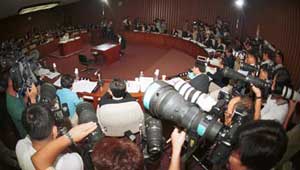A male-oriented cartel of silence called ''suspicion''
Public hearing acknowledged to have created strict moral standards for civil servants

Ji Eun Hee of the KWAU Guidance Committee drew a frank and vivid picture of her feelings when she had been filled with expectations of Korea's first woman Prime Minister. Recalls Ji, "Chang's appointment was a revolutionary event with great significance in that it proved that a woman could become Prime Minister in a country where women's political participation is far from flourishing." Although the new Prime Minister would have been in office for only 7 months, Ji had welcomed Chang's appointment because interest in women's issues would have basically increased during her term, Chang had been best suited for the post compared to other women, and although neither a reformist nor a progressive herself, Chang had proven that she maintained an open attitude towards reform and progress.
Ji thinks that "in light of precedents, Chang's appointment would have been approved if Chang were a male politician with the usual political connections, even if the public hearing had been conducted no differently." Whether this is just an imagined concern or the truth will be proven in the process of voting for the next Prime Minister appointee.
Cho Hyun Ok, representative of the Democratic Alliance for Women's Political Empowerment, said, "There are those who point to the rising moral standards that citizens and legislators apply to public officials or the weakening control over state affairs by a lame duck president as the reasons behind the rejection of Chang, but what is tormenting women is the nagging suspicion that the actual reason might have been the silent cartel that has been created behind the superficial reason of moral degradation."
Cho also said, "Although we should continue to increase women's participation in politics, we should have moral guidelines that take precedence over gender. We should not support someone simply because she's a woman but with a view to enhancing women's participation for social and democratic advancement."
Professor Chung Dae Hwa (Political Science, Sangji University), who began his presentation with the hope that the public hearing would not spread into a battle of the sexes, expressed his disappointment by saying, "A public hearing to decide on the appointment of a Prime Minister should aim to investigate whether the appointee is qualified to be a Prime Minister. A Prime Minister who has been slandered and hurt in a public hearing cannot carry out his or her duties properly. A public hearing is to verify whether the candidate is qualified, but Chang's public hearing seemed caught up only in proving that she does not."
Nevertheless, Chung recognized that few would disagree that public hearings were an effective tool for checking the president's monopoly on rights to appoint government officials. He went on to say that "if the politicians made such a fuss over a Prime Minister, then at least an 'abstract framework' has been established to judge both elected and appointed civil servants in the future, which is clearly an important step forward achieved by the public hearing."
Other opinions presented at the discussion included the need to improve the media's role. Professor Lee Hyo Seong (Mass Communications, Sungkyunkwan University) pointed out that "media reports on Chang stopped at repeating whatever information had been provided to the press without going through the process of verifying the facts, while legislators questioning Chang kept repeating the questions posed by the media reports." Lee went on to recommend that the media be charged with verifying the facts before making reports, so that the media and the legislators and the media are allocated different roles and the reports can be used during the public hearing after going through simple verification procedures.
Participants at the discussion agreed that women and civic groups should not only monitor future public hearings to ensure that the same criteria applied to Chang is applied to all government official appointees but also formulate a fair assessment system encompassing the appointee's nationality, military service, tax payment, academic achievements and method of increasing property, and apply the system to the scrutiny of presidential candidates, high-ranking officials and legislators.

